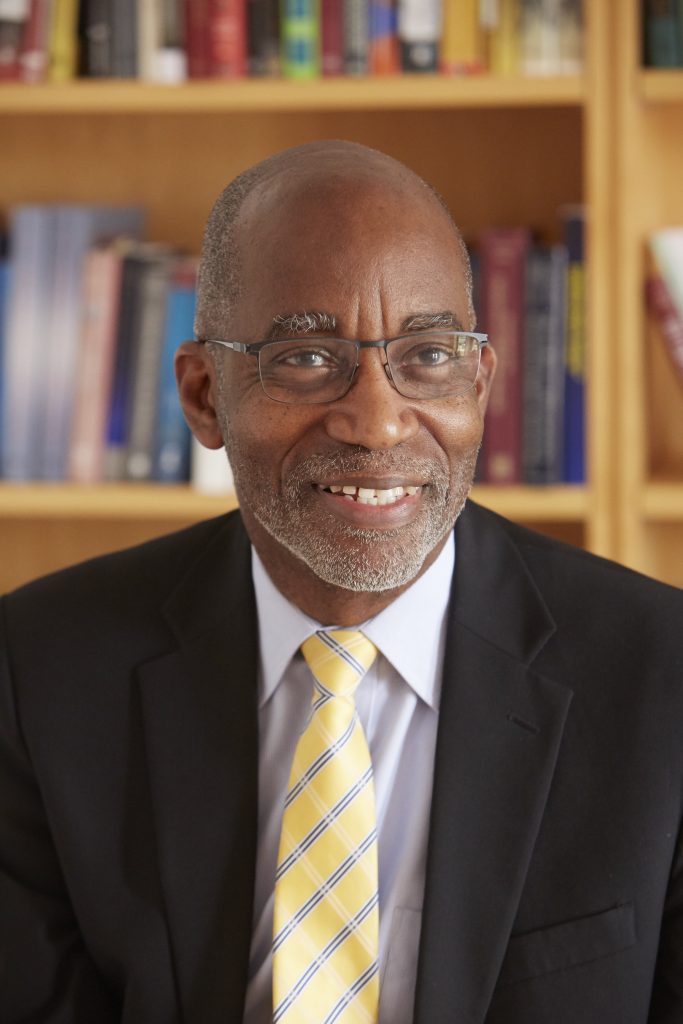Featuring Keynote Speaker
David R. Williams

Dr. David Williams is the Norman Professor of Public Health and Professor of African and African American Studies at Harvard University. His prior academic appointments were at Yale University and the University of Michigan. The author of more than 600 scientific papers, his research has enhanced our understanding of the ways in which socioeconomic status, race, stress, racism, health behavior and religious involvement can affect health. The Everyday Discrimination Scale that he developed is the most widely used measure of discrimination in health studies. He is an elected member of the National Academy of Medicine, the National Academy of Sciences and the Royal College of Psychiatrists in the UK. He has been ranked as the Most Cited Black Scholar in the Social Sciences, and as one of the World’s Most Influential Scientific Minds. Dr. Williams has been involved in the development of health policy at the national level. Currently, he serves on the Board of the Robert Wood Johnson Foundation, the UK’s National Health Service’s Race and Health Observatory, and the Kellogg Foundation’s Solidarity Council on Racial Equity. He has been featured by some of the nation’s top print and television news organizations and his TED Talk has over 2 million views.
Session 1

Melicia Whitt-Glover, PhD, FACSM
Executive Director, Council on Black Health
Dr. Melicia Whitt-Glover is the Executive Director of the Council on Black Health and the President and CEO of Gramercy Research Group in Winston-Salem, NC. With over 20 years of experience, she leads research and evaluation projects to address health disparities, focusing on promoting physical activity, healthy diets, and weight management in underserved communities. Her work has been funded by NIH, PCORI, and other organizations. She holds a PhD in Epidemiology from the University of South Carolina, a postdoctoral fellowship from the University of Pennsylvania, and BA and MA degrees in Exercise Physiology from UNC-Chapel Hill. She is a Fellow of the American College of Sports Medicine.
Olivia Affuso, PhD, FACSM
Director of Strategic Leadership Initiatives, Council on Black Health
Dr. Olivia Affuso is the Director of Strategic Leadership Initiatives at the Council on Black Health and a Senior Research Scientist with the Gramercy Research Group. Previously, she was a tenured Associate Professor in Epidemiology at the University of Alabama at Birmingham and co-Director of the Investigator Development Core for UAB’s Obesity Health Disparities Research Center. Her research, funded by NIH and the American Heart Association, focuses on health disparities and obesity prevention. Dr. Affuso holds a PhD in Nutrition Epidemiology from UNC-Chapel Hill and completed a postdoctoral fellowship at the University of Miami. She has been featured on platforms such as TED, Disney+, and PBS.
Session 2

Shiriki Kumanyika, PhD, MPH
Founding Chair, Council on Black Health
Emeritus Professor of Epidemiology at the University of Pennsylvania Perelman School of Medicine
Dr. Shiriki Kumanyika is an Emeritus Professor of Epidemiology at the University of Pennsylvania Perelman School of Medicine with an interdisciplinary background in social work, nutrition, and public health. She served as Associate Dean for Health Promotion and Disease Prevention, held a secondary appointment in Pediatrics, and was the Founding Director of Penn’s Master of Public Health program. Dr. Kumanyika’s research focuses on strategies to reduce nutrition-related chronic disease risks and achieve health equity, particularly for Black Americans. Dr. Kumanyika founded the African American Collaborative Obesity Research Network (AACORN) in 2002, which evolved into the Council on Black Health. A member of the National Academy of Medicine, she chairs its Food and Nutrition Board and has advised organizations such as the WHO and the World Cancer Research Fund.

Travis Moore, PhD
Postdoctoral Researcher, Friedman School of Nutrition Science and Policy, Tufts University
Dr. Travis R. Moore is a community psychologist and systems scientist. His work focuses on enhancing collective action in community coalitions to promote child health equity. His research explores how multi-sector collaborations form effective networks to implement policy, system, and environmental changes that address social and structural determinants of health. Dr. Moore holds an NIH Pathway to Independence (K99/R00) Award from NICHD, investigating the feasibility of using network interventions within coalitions to prevent chronic diseases in children. He earned a BA in Biology and an MS in Counseling Psychology from Southern Methodist University and a PhD in Civil Society and Community Research from the University of Wisconsin-Madison.
Yuilyn Chang-Chusan, MS
PhD Candidate, Friedman School of Nutrition Science and Policy, Tufts University
Yuilyn (Yui) A. Chang Chusan is a Health Policy Research Scholar, a national leadership program of the Robert Wood Johnson Foundation led by Johns Hopkins Bloomberg School of Public Health, which supports doctoral students addressing pressing health policy challenges. Her research focuses on community-based systems dynamics to tackle issues like housing and food access in low-income communities, aiming to drive policy, systems, and environmental changes. Yui earned her MS in Food Policy and Applied Nutrition from the Friedman School of Nutrition.
Session 3

Chelsea Singleton, PhD, MPH
Assistant Professor, Department of Social, Behavioral, and Population Sciences, Celia Scott Weatherhead School of Public Health & Tropical Medicine, Tulane University
Dr. Chelsea R. Singleton is a nutritional epidemiologist whose research aims to document and dismantle structural barriers to healthy eating in low-income and historically racialized communities. She is the recipient of an NIH/NIMHD K01 award, which has enabled her to study the nutritional consequences of crime and violence in Black communities. Dr. Singleton holds a PhD in Epidemiology from the University of Alabama at Birmingham and an MPH in Epidemiology from Tulane University School of Public Health and Tropical Medicine. She completed a USDA-funded post-doctoral research fellowship at the University of Illinois at Chicago and was previously a faculty member at the University of Illinois at Urbana-Champaign.
Mark Pachucki, PhD
Associate Professor, Department of Sociology, College of Social and Behavioral Sciences, University of Massachusetts-Amherst
Dr. Mark Pachucki examines the social determinants of health, social network dynamics, and culture, focusing on how relationships and context shape health behaviors and disparities over the life course. Formerly at Massachusetts General Hospital and Harvard Medical School, he completed postdoctoral training with the Robert Wood Johnson Foundation Health & Society Scholars program. Supported by NSF, NIH, and RWJF, Dr. Pachucki emphasizes team-based science and interdisciplinary collaboration to address social inequalities, including health, race, gender, and socioeconomic disparities. As an educator, he is committed to fostering an inclusive, reflective academic environment that values diversity of thought and experience. He is also an Affiliate Professor at the Computational Social Science Institute, UMass Amherst

Vanessa Nicholson Robinson, DrPH, MPH
Assistant Professor, Department of Public Health and Community Medicine, Tufts University School of Medicine
Dr. Vanessa N. Robinson is a health equity research scientist specializing in maternal health and nutritional justice. She played a key role in co-authoring the proposal for the inaugural Tufts Center for Black Maternal Health and Reproductive Justice and collaborates with the Commonwealth of Massachusetts as Chief Report Editor for the Special Commission’s Report on Racial Inequities in Maternal Health, which informed legislation on midwifery care access. Dr. Robinson is Public Health Advisor for the Birth-by-Us app, a reproductive management tool for Black birthing mothers, and Principal Investigator of the Black Rainbow Justice Initiative, exploring Black LGBTQ+ family-building experiences. In food equity, she is a Co-Investigator on Delta GREENS, a $6M NIH-funded Food is Medicine initiative addressing chronic health disparities in the Mississippi Delta, and co-author of the Aspen Institute’s 2024 Research Action Plan on nutritional health equity.
Danielle Krobath, PhD
Assistant Professor, Department of Epidemiology and Biostatistics, Arnold School of Public Health, University of South Carolina, Columbia
Dr. Danielle Krobath’s research addresses health inequities in children and families, focusing on the impact of discriminatory policies and systems on nutrition-related behaviors and chronic health outcomes. Using community-engaged approaches, her work aims to improve access to federal nutrition assistance programs, such as SNAP and WIC, and identify causal mechanisms linking racism and other intersecting forms of social oppression with food insecurity and diet-related diseases across the life course. Dr. Krobath holds a PhD and MS in Food and Nutrition Policy and Programs from the Friedman School. She completed postdoctoral training at Tufts as the inaugural Obesity Equity Fellow. Her work is supported by the NIH and the Robert Wood Johnson Foundation Healthy Eating Research Program.